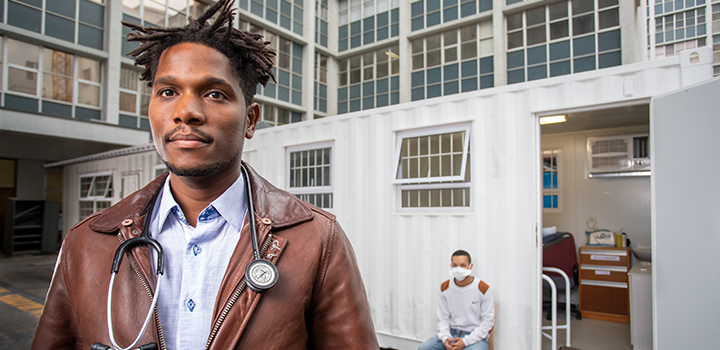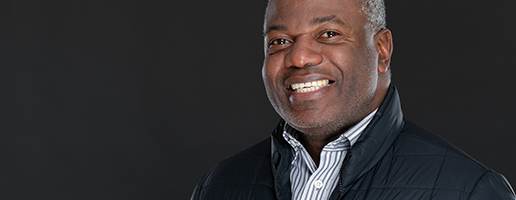Overcoming huge odds to help others fight TB

While believing that education is one of the key strategies in addressing poverty, disease and crime in South Africa, specialist physician and pulmonologist Dr Donald Simon says experience has taught him that knowledge is not necessarily power.
Citing the ubiquitous Love-Life HIV prevention campaign aimed at teenagers when the AIDS pandemic burgeoned out of control from 2000, Dr Donald Simon says most young people knew HIV caused AIDS, yet failed to change their risky lifestyles.
“It’s the same with non-communicable diseases (NCDs). Some of our patients refuse to take responsibility for their own health. Sometimes medicine can’t be practised as the book suggests, so you need to tailor your approach.”
Research could revolutionise TB treatment
Dr Simon is setting out to do just that – in spite of the country’s dismal levels of formal education. Based at the University of Stellenbosch, he is researching treatment shortening of one of the country’s biggest HIV-driven killers, tuberculosis, using the Academic Fellowship Award he received from the Discovery Foundation.
His team will combine single-scan Positron Emission Tomography (PET) and computerised tomography (CT) scans to interrogate properties related to anatomy and metabolic activity of TB lung lesions. Patients at higher risk of poor outcomes (indicating six months of treatment), can then, for example, be singled out from those at lower risk.
Combining this with the GeneXpert cycling threshold value and medicine compliance, will help his team allocate patients to one of three study arms.
Time horizon
Dr Simon’s work will start in earnest in January 2020, beginning with the first group of patients, some from two years ago, who have given blood and sputum samples. He will use these samples from the large biorepository to identify relapses and failed treatment to begin his laboratory work, which he expects to take three years.
“We feel fairly confident. I’ve been looking at the failed trials so far and none of them used PET-CT scanning and GeneXpert cycling thresholds to divide patients into groups,” he emphasises. He will be guided by separating out patients with large lung lesions that have not shrunk and those with high bacterial loads. By identifying the minority (some 15% to 20%) of patients with complications, they can avoid the side effects and costs of lengthier treatment in future and improve adherence to treatment.
Triumphing over adversity
If the TB epidemic, with its burgeoning multi-drug resistant and extreme-drug resistant manifestations, has proven a rough taskmaster for scientists, then Dr Simon’s upbringing and triumphs over adversity have equipped him admirably for his ambitious task.
Dr Simon was born to an impoverished domestic-worker mother and epileptic security-guard father in Galeshewe township outside Kimberley. With both his parents passing away within a year of one another when he was 21 and a full-time varsity student, Dr Simon learned independence early on. “We lived in a shack for most of my childhood and two years before I went to university, my parents finally secured an RDP house. I had a brother who was three years older but he was stabbed to death when I was 12 or 13. It was a pretty violent neighbourhood,” he says.
His mother pulled him out of a township junior school to attend Adamantia High School in Kimberley, where he became an honours student within months. “It came at great cost to her. She worked her fingers to the bone to get me into a good school to improve my chances of becoming anything,” he says.
He can remember loving history and considered journalism or photography early on. “One of my Afrikaans teachers prescribed a brilliant book entitled Die uurwerk kantel by Marie Heese. I’ll never forget that book because it inspired a service ethic in me.” His determination and a good matric pass led to him applying to Potchefstroom University where he completed his first year of BPharm with 10 distinctions.
Unease with his initial career choice led him to apply for medicine at Stellenbosch University. Dr Simon won the Stellenbosch University Rector’s Award for Succeeding against the Odds, garnering distinctions in most subjects for his first three years.
“It was a sad experience for me, with my parents dying in my third and fourth years, but I didn’t even have time to mourn, I had to get on with it. Failing anything was not an option. I’d realised early on that I had nobody to fall back on, no safety net,” he adds.
Instead, he turned his passion and Afrikaans-speaking background into tutoring his fellow students, especially the English speakers. He returned to Kimberley to do his internship and community service at the local hospital.
“I think I also wanted to complete my mourning properly, but I always had a dream of going back to help,” he says.
He cannot remember any specific event or person nudging him into medicine, but by the time he started his hands-on clinical training, the AIDS pandemic was in full swing. It was during his internship that he “fell in love” with medicine by experiencing first-hand how he could make a difference.
Unmarried and turning 37 in 2019, Dr Simon commutes from Tamboerskloof to Tygerberg Academic Hospital where he balances his research with teaching and clinical work. With helping, guiding and teaching his peers and students engrained into his psyche, he sees education as the most efficient long-term cure for South Africa’s problems.
“We’re constantly trying to patch up holes. Why can we not bring the percentage of students who actually write matric up from 50% to 90%? Pass rates count for little, when you’re dealing with that,” he says. One could say he is a living example of what is possible.
Unique shortening of TB treatment
Dr Simon is hoping that his unique research will enable the TB-treatment period to be reduced from six months to four, increasing adherence and reducing costs. He will use genetic transcriptional signatures to separate patients most likely to benefit from shorter treatment from those better suited to six months of therapy.
Existing research shows that up to 85% of patients treated for four months have a favourable outcome, but it’s somewhat unclear who will benefit. His hypothesis is that if his work can single out those patients most likely to benefit from shortened treatment, this success percentage can be higher and can trim two months off the treatment time. This stands to revolutionise treatment globally by boosting adherence and dramatically lowering costs.
About the Discovery Foundation
Each year, the Discovery Foundation gives five different awards to outstanding individual and institutional awardees in the public healthcare sector.
The Discovery Foundation is an independent trust with a clear focus to strengthen the healthcare system by ensuring that more people have access to specialised healthcare services.
Since 2006, the Discovery Foundation has invested more than R230 million in training and support for more than 400 medical specialists and institutions. The grants support academic research and clinical science, sub-specialist training, rural medicine as well as programmes to develop public healthcare resources. For 2019, Discovery Foundation awarded 42 grants to medical specialists working in South Africa’s healthcare sector to the value of R27 million.
Learn more and apply for the 2020 Discovery Foundation Awards.
Related articles

When a big brother makes all the difference
Dr Nyaweleni Tshifularo’s 2019 Discovery Foundation Distinguished Visitor Award allows him to help improve the knowledge and skills of all clinicians in both general surgery and paediatrics at the Polokwane Mankweng Hospital Complex.

Celebrating the mental health heroes of Discovery
To wrap up Mental Health Awareness Month, we honour a few of our mental health heroes – five Discovery Foundation Awards alumni and one supervisor whose positive contribution to mental healthcare has had a ripple effect across South Africa.

Eastern Cape doctor receives Discovery Foundation Award to research catatonia
Psychiatric registrar Dr Carmenita Groves says her analysis of arguably the largest cohort of patients diagnosed with catatonia in South Africa, observing their presentation, management and outcomes, is already boosting referrals at Dora Nginza Hospital.